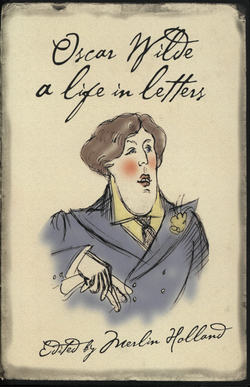Читать книгу Oscar Wilde: A Life in Letters - Оскар Уайльд, Merlin Holland, F. H. Cornish - Страница 8
To Lady Wilde
Оглавление8 September 1868 Portora School
Darling Mama, The hamper came today, I never got such a jolly surprise, many thanks for it, it was more than kind of you to think of it. The grapes and pears are delicious and so cooling, but the blancmange got a little sour, I suppose by the knocking about, but the rest all came safe.
Don’t forget please to send me the National Review, is it not issued today?
The flannel shirts you sent in the hamper are both Willie’s, mine are one quite scarlet and the other lilac but it is too hot to wear them yet, the weather is so hot.
We went down to the horrid regatta on Thursday last. It was very jolly. There was a yacht race.
You never told me anything about the publisher in Glasgow. What does he say and have you written to Aunt Warren on the green note paper?
We played the officers of the 27th Regiment now stationed in Enniskillen, a few days ago and beat them hollow by about seventy runs.
You may imagine my delight this morning when I got Papa’s letter saying he had sent a hamper.
Now dear Mamma, I must bid you goodbye as the post goes very soon. Many thanks for letting me paint. With love to Papa, ever your affectionate son OSCAR WILDE
In 1871 he won an entrance scholarship to Trinity College, Dublin, and went there armed with an exhibition from Portora. During the next three years he had the distinction of being made a Foundation Scholar and won many prizes for classics, including the Berkeley Gold Medal for Greek. He also came strongly under the influence of the Rev. John Pentland Mahaffy (1839–1919). This remarkable man (who later became Provost of the College and was knighted in 1918) was then Professor of Ancient History. His passion for all things Greek, his study of the art of conversation and his social technique all left their mark on his pupil.
In 1874, at the age of nineteen, Wilde crowned his Irish academic successes by winning a Demyship (scholarship) to Magdalen College, Oxford and in October, a week before his twentieth birthday, he took up residence there to read Classics. What Dublin had sowed, flowered intellectually in Oxford. He made the acquaintance of John Ruskin, Slade Professor of Fine Art, and having attended his lectures on Florentine Aesthetics in his first term, was soon persuaded to take part in his new mentor’s practical improvements to the countryside, and found himself rising at dawn to help build a country road. The reward was less in the toil than in the pleasure of breakfasting with Ruskin afterwards. The road, however, soon sank back into Hinksey Marsh but their friendship flourished. When Wilde sent him acopy of The Happy Prince in 1888 (see p. 108) he accompanied it with a note: ‘The dearest memories of my Oxford days are my walks and talks with you, and from you I learned nothing but what was good…There is in you something of prophet, of priest, and of poet.’
Soon after his arrival in Oxford Wilde read Walter Pater’s Studies in the History of the Renaissance. Pater was a young don at Brasenose College whom Wilde did not meet in person until his third year but on whose theories of art and aesthetics he was already starting to base his own flamboyant style. He found himself disturbingly attuned to the book’s philosophies, especially those in the ‘Conclusion’ in which Pater said: ‘Not the fruit of experience but experience itself is the end’ and continued, ‘To bum always with this hard gem-like flame, to maintain this ecstasy, is success in life.’ He also declared that enrichment of our given lifespan consisted of ‘getting as many pulsations as possible into the given time’ and of having ‘the desire for beauty, the love of art for its own sake’. Writing from prison two decades later Wilde would refer to it as ‘that book which has had such a strange influence over my life’.
Ruskin and Pater each appealed to a different Wilde: Ruskin to the intellectual, the noble, the high-minded; Pater, more insidiously, to the sensual, the decadent, the mystical. Pater was less uplifting for the soul but dangerously attractive to the senses.
But the excitement of new teachings did not lead Oscar to abandon old friends. He still found time for Mahaffy and, together with a young Dubliner, William Goulding, they travelled through Italy during the summer vacation of 1875. Ruskin had fired him with the desire to experience the Renaissance for himself and his old tutor provided the opportunity. They visited Venice, Padua, Verona, Milan and Florence from where he wrote to his father, reflecting their shared interest in history and archaeology.
